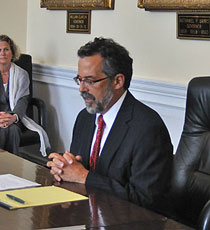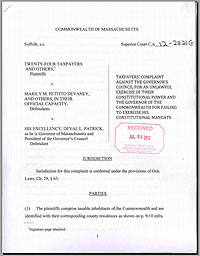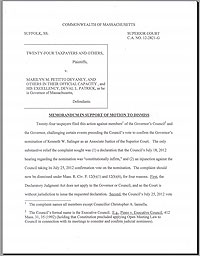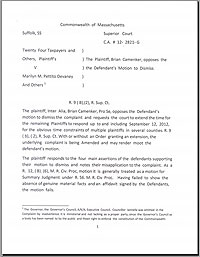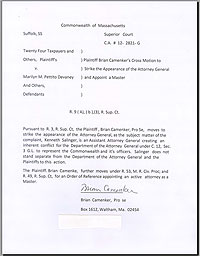Fighting Judicial activism..Taxpayer Lawsuit against Governor's Council
by Mass Resistance
MassResistance has filed a "taxpayer lawsuit" by 31 citizens across the state against the Governor's Council, including the Governor and the Lt. Governor, citing serious constitutional and procedural issues in the way they approve judges. This is also in preparation to file an order to stop the swearing-in of a left-wing activist nominee recently approved.
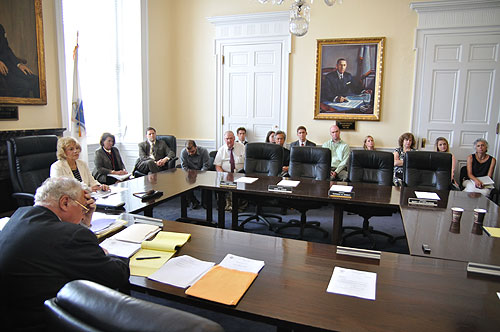 Too many of the Governor's Council's hearings for judicial nominees look like this: Just two members present. One acting as chairman. Governor and Lt. Governor nowhere to be found. Citizens lining the walls. |
Judicial activism in Massachusetts
In recent years Massachusetts has become infamous for its activist anti-family judges. Some well-known cases include the groundbreaking 2003 Goodridge ruling that forced same-sex "marriage" on the state, and the 1995 South Boston St. Patrick's Day Parade case granting the "right" to a homosexual group to march in a parade against the wishes of the organizers. (The pro-family group lost on every level in the state courts -- then won 9-0 in the US Supreme Court!)
Left-wing judicial activism and bias has become so prevalent that it's come to a point where pro-family people are unwilling to go to court for help anymore. This is particularly exacerbated in the family courts, where a large fatherhood movement coalesced to confront a judiciary stacked against them.
More and more activist judges
The era of partisan, activist judges has only accelerated with the present governor, Deval Patrick. For example, he has nominated three high-profile lesbian activists who have become judges:
Cheryl Jacques (2008) as an Industrial Accidents Board (IAB) judge. (Jacques previously ran the national homosexual group Human Rights Campaign.)
Maureen Monks (2009) to Middlesex Probate and Family Court
Barbara Lenk (2011) to the Supreme Judicial Court
And there are many others throughout the court system. The Governor's Council is the only thing standing between the Governor's nominations and decades of activism on the bench.
What is the Governor's Council?
In the U.S. Constitution, the U.S. Senate must approve federal judicial nominations, whom the president nominates. In Massachusetts, the Governor nominates judges, and they must be approved by the Governor's Council, a body of eight people elected every two years from eight districts across the state. The Governor's Council is chaired by the Governor (who doesn't vote), and also includes the Lt. Governor. It usually meets weekly in the Governor's office suite in the State House.
For much of Massachusetts history, the Governor's Council took its job seriously. And the caliber of the judges in the state reflected that. But in recent decades it has tended to attract political hacks, eager to please the political establishment, who use the position for personal prestige or as a stepping-stone to other political positions. The fact that most people don't even know what the Governor's Council is - despite its crucial role - makes things even worse.
It is very crucial. Judges in Massachusetts are appointed for lifetime tenure. A bad choice can affect the justice system for decades. And we've all seen Governors of both parties appoint judges whose main qualification is having donated money to their campaigns, or for political favors, or for "diversity" or other ideological reasons. Since there are no formal qualifications for judges, literally anyone can be nominated.
But in recent decades the rate of rejection by the Governor's Council has been one every ten years!
Just going with the flow
There is a lot of pressure not to make waves. The Governor's Council rarely has more than one or two members willing to buck the trend and vote against obviously unqualified or ideological judges. Currently, Charles Cipollini is the best in years at holding the line. And Mary Ellen Manning has also shown courage at times, though she is not running for re-election.
The closest vote in recent memory was with the nomination of Maureen Monks (listed above), a lesbian activist attorney and an outrageously partisan pick. Even then, the voice vote was 5-3 to accept her. Marilyn Devaney later switched her vote when it came to entering the votes in writing in the register, making it 4-4 and thus apparently not passing. But the Governor stated he was considering the voice vote as "official" so Monks was sworn in. By any normal standard it should have been 8-0 against.
Anyone who attends Governor's Council meetings (they are open to the public) would be horrified at the lack of interest that Council members seem to have in the background of the nominees or how they will act.
As Joe Ureneck, a Fatherhood Coalition activist and regular attendee, says:
"At the hearings there are no questions of substance asked from the Councilors to the nominees that address their personal belief system, the role of judges, their legal philosophy, or their ideas on social issues. They are completely blank slates when they are approved."
It's often up to members of the public to bring up these things, testifying at the public hearings that the Council holds for the nominees. And even then it is common for Council members to publicly berate citizens at the meetings for asking such questions, which they often deem "inappropriate."
Joe Ureneck related that at a recent hearing for a district court judge, he suggested that a nominee's activist role as the administrator of a domestic violence program might indicate that might have bias against men and fathers when issuing restraining orders. One of the Councilors, Jennie Caissie, proceeded to scold Joe, saying that his "attack" on the nominee was "a foolish and silly thing to do." Governor's Council members have unfortunately become more well known for reprimanding members of the public than challenging the nominees themselves. See more abuse against citizens testifying at a Governor's Council hearing HERE.
Over the edge: The Salinger nomination
|
On July 18, the Council held a hearing for Kenneth Salinger, nominated by the Governor to be a Superior Court judge. (See our report HERE.) Salinger, currently an assistant attorney general (one of about 300), would be a pro-family citizen's nightmare. Salinger has given thousands of dollars to the radical left-wing activist group MoveOn.org, to the pro-abortion group EMILY'S List, and to various prominent left-wing pro-abortion politicians across the country. |
|
In addition, at the AG's office Salinger has been particularly zealous in helping to fight legal challenges to anti-family legislation such the Buffer Zone law. And before that, while at the Boston law firm of Edwards Angell Palmer & Dodge, he co-wrote an amicus brief asking the federal courts to declare the military's "Don't Ask Don't Tell" policy unconstitutional.
The Council's public hearing for Salinger was not attended by the Governor or Lt. Governor, but instead chaired by one of the members, Marilyn Devaney. And at times only two Councilors were even present. MassResistance and others were there to give testimony, but were treated rudely and condescendingly by the members of the Council. In addition, Councilor Devaney intimidated some of the citizens who came to testify against Salinger by requiring them to take an "oath" to tell the truth, which was not asked of those testifying in favor of him, and is virtually unheard of at public hearings.
With Salinger poised to get a lifetime job as a powerful Superior Court judge, and the fact that there have obvious constitutional issues at that meeting and others, it was decided that action needed to be taken.
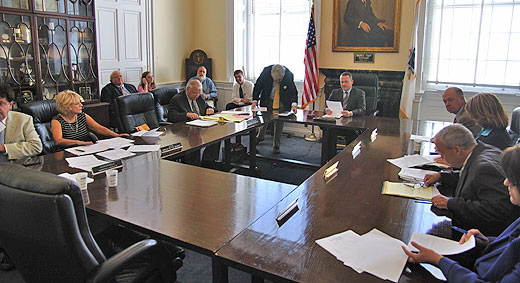 Too many votes look like this: The Governor is somewhere in the State House but doesn't bother to show up. So Lt. Governor takes over, as if Governor were out of state. |
Constitutional violations at Governor's Council meetings
Anyone who attends the Governor's Council meetings and then reads the Massachusetts Constitution would be pretty shocked. They basically do what they want.
In our lawsuit, the constitutional issues that we bring up are:
1. The Governor never shows up at Governor's Council meetings. The Lt. Governor only attends if there is a vote taken, at which point he acts as the chairman. But the constitution requires that the governor run the meetings. The Lt. Governor must run them if the Governor is "absent." However, the constitution considers the governor "absent" only if he is out of state or incapacitated ("when the chair of the Governor shall be vacant") - not if he is simply in the other room, or at home, etc.
2. There is no Constitutional provision for the Council to meet with neither the Governor nor Lt. Governor present. Yet that happens the majority of the time.
3. At all meetings (or "assemblies") of the Council there must be a quorum, which is five members. There is often no quorum at meetings.
4. There is no Constitutional provision (or even a written policy) for a "public hearing" meeting of the Council that has different rules and procedures from a regular hearing. Any "assembly" of the Council must follow the constitutional rules.
5. We are also asserting that the Constitution directs that nominations must be made by the Governor to the Council at Council meetings, not by other means such as mailing a letter, etc.
The relevant parts of the Constitution regarding that are:
Chapter II, Section II. Article II. The governor, and in his absence the lieutenant governor, shall be president of the council, but shall have no vote in council: and the lieutenant governor shall always be a member of the council except when the chair of the governor shall be vacant.
Chapter II, Section I. Article IV. The governor shall have authority from time to time, at his discretion, to assemble and call together the councilors of this commonwealth for the time being; and the governor with the said councilors, or five of them at least, shall, and may, from time to time, hold and keep a council, for the ordering and directing the affairs of the commonwealth, agreeably to the constitution and the laws of the land.
Chapter II, Section I. Article IX. All judicial officers, the solicitor-general, [and] coroners shall be nominated and appointed by the governor, by and with the advice and consent of the council; and every such nomination shall be made by the governor, and made at least seven days prior to such appointment.
NOTE: Throughout the Constitution the terms "absence" and "absence from the Commonwealth" are used interchangeably when referring to the Governor.
This may seem mundane, even trivial but it is not. It all causes judges to be rushed through with little or no scrutiny. Citizens are tired of such blatant disregard for the constitutional process in the vetting of judges.
This kind of intentional sloppiness and disregard for the law is an outrage and an insult to every citizen. Why do politicians feel they can get away with it? Because everyone is playing the game and no one challenges them. It also reflects how little they feel about the importance our judicial system.
A "taxpayers' lawsuit"
The process of redress we felt most appropriate is outlined in Chapter 29, Section 63 of the Massachusetts General Laws. This allows a group of taxpayers to sue for an injunction to restrain Commonwealth from spending money or incurring obligations if it is being done through the unlawful exercise or abuse of power. The swearing in of Kenneth Salinger as a judge would certainly incur spending obligations (for his salary, staff, etc.). Such a "taxpayers lawsuit" requires a minimum of 24 taxpayers from at least four counties.
Step 1: The lawsuit gets written, signatures gathered, and filed
Our goal was to get a lawsuit filed within a week, before the July 25 Council meeting to vote on Salinger. We finally got the lawsuit prepared on July 23. Luckily, with very little time to go, MassResistance gathered more than enough signers as co-plaintiffs -- 31. In addition, at least another 30 were also willing to sign but we couldn't physically get to them in time. We filed the suit in Suffolk Superior Court on the afternoon of July 24. On the morning of July 25, before the Council meeting, the Governor, Lt. Governor, and the Council members were served by a constable.
|
HERE's the lawsuit that was filed. Councilor Marilyn Devaney, who had been particularly hostile at the July 18 hearing, was named as the lead defendant. The lawsuit also called for a delay in the scheduled July 25 vote on Salinger until this could be brought to court. Filed on July 24. |
Outrageous reaction to lawsuit at July 25 meeting
The following day after the suit was filed, July 25, the Council met for its scheduled vote on Salinger. The members had all been served with the lawsuit that morning.
What took place was no less than outrageous. When the meeting began, several Council members took turns standing up and castigating and demeaning the lawsuit, and (with the exception of Cipollini and Manning) claiming that it was not going to let it stop them. Cipollini made a motion to delay the vote on Salinger, which failed. There were more outrageous statements made. Then they voted to accept Salinger.
We were there and took video and photos of what took place. This meeting and the statements made were so shameful and offensive that we will devote another email (hopefully later this week) to describing and showing it. (And wait until you see what ELSE happened at that meeting!)
Step 2: Attorney General's office files motion to dismiss lawsuic
|
As we expected, the Massachusetts Attorney General's office, which is defending the Council in the lawsuit, answered back with a motion to dismiss. Filed on July 14. You can read it HERE. |
We feel their reasoning is very weak. For example, they are claiming that a "taxpayers lawsuit" is inappropriate because money will not be spent. But of course it will - on the judge. And they are claiming that somehow the Constitution allows for a different kind of Council "public hearing" meeting with different rules, even though there no provisions stated and there is nothing even in writing about that anywhere.
In the meantime we are also pursuing a separate restraining order to stop Salinger's swearing-in, which is scheduled for Sept. 17 and would officially make him a judge.
Step 3: We answer the AG's motion to dismiss the lawsuit
|
This was filed on Monday, Aug. 27. We rebut the arguments made by the Attorney General in her motion to dismiss. You can read it HERE. |
Step 4: We file Motion to Strike Appearance of Attorney General
|
This was also filed on Monday, Aug. 27. Since Kenneth Salinger, a subject of the lawsuit, is part of the Attorney General's office, that presents a conflict of interest according to Massachusetts Law. Therefore, we are petitioning that a separate attorney be appointed to represent the Commonwealth. You can read it HERE. |
Step 5: More filings coming up
Among other things, there will be more filings challenging the validity of the appointment of Salinger prior to his currently scheduled Sept. 17 swearing-in as Superior Court Judge.
Interesting legal problem - finding a lawyer
One difficulty we have is that all 31 taxpayers have been filing these "pro se," as individuals without a lawyer representing the entire group. Why is that? Although we contacted a lot of local conservative lawyers, many had fears that (1) by attacking Salinger's nomination, judges (including Salinger) would take retribution against them, and (2) by suing the Governor's Council they would antagonize them and never get approved to become judges themselves. It's a sad state of affairs. However, this week we've been talking with a veteran Massachusetts pro-family lawyer who called us back, is not afraid, and is considering taking this on.
In the meantime, we've been getting free legal help in all phases of the case from MassResistance supporters who are experts in this kind of law and court procedure.
Is all this worth it?
According to sources in the State House, no one has ever done this before. No one has ever sued the Governor's Council for any reason, much less for alleged constitutional violations. Although several are outwardly angry at this, we believe that one or two are secretly glad we're doing it.
Some people might say, "Why go to all this trouble?" It's because we feel that this kind of pressure and push-back is absolutely necessary. We need to do more of it, not less. The fact that citizens don't resist high-handed and tyrannical behavior by public officials is why we're in the terrible situation we find ourselves in.
And in a way, this is also a page from the opposition's playbook. Keep in mind that the homosexual lobby tried dozens of "civil union" and "gay marriage" court cases and similar tactics that, at the time, we all looked at individually as grasping at straws. But they kept at it. Even the Goodridge "gay marriage" ruling, we believe, came as a surprise to them, since they had lost in the lower courts. And look where they've ended up. It's about time we use this tactic.

